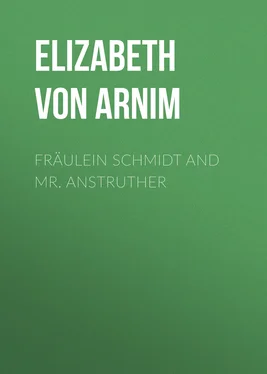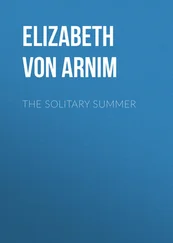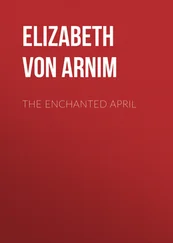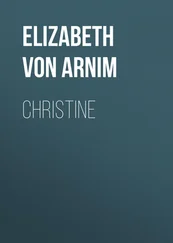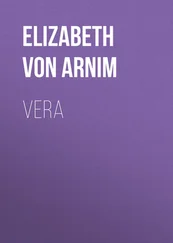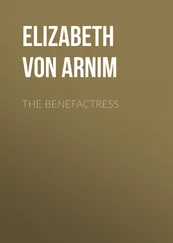Elizabeth von Arnim - Fräulein Schmidt and Mr. Anstruther
Здесь есть возможность читать онлайн «Elizabeth von Arnim - Fräulein Schmidt and Mr. Anstruther» — ознакомительный отрывок электронной книги совершенно бесплатно, а после прочтения отрывка купить полную версию. В некоторых случаях можно слушать аудио, скачать через торрент в формате fb2 и присутствует краткое содержание. Жанр: Фантастические любовные романы, foreign_antique, foreign_prose, Зарубежные любовные романы, на английском языке. Описание произведения, (предисловие) а так же отзывы посетителей доступны на портале библиотеки ЛибКат.
- Название:Fräulein Schmidt and Mr. Anstruther
- Автор:
- Жанр:
- Год:неизвестен
- ISBN:нет данных
- Рейтинг книги:3 / 5. Голосов: 1
-
Избранное:Добавить в избранное
- Отзывы:
-
Ваша оценка:
- 60
- 1
- 2
- 3
- 4
- 5
Fräulein Schmidt and Mr. Anstruther: краткое содержание, описание и аннотация
Предлагаем к чтению аннотацию, описание, краткое содержание или предисловие (зависит от того, что написал сам автор книги «Fräulein Schmidt and Mr. Anstruther»). Если вы не нашли необходимую информацию о книге — напишите в комментариях, мы постараемся отыскать её.
Fräulein Schmidt and Mr. Anstruther — читать онлайн ознакомительный отрывок
Ниже представлен текст книги, разбитый по страницам. Система сохранения места последней прочитанной страницы, позволяет с удобством читать онлайн бесплатно книгу «Fräulein Schmidt and Mr. Anstruther», без необходимости каждый раз заново искать на чём Вы остановились. Поставьте закладку, и сможете в любой момент перейти на страницу, на которой закончили чтение.
Интервал:
Закладка:
They were talking about sin. We don't sin much in Jena, so generally they talk about sick people, or their neighbor's income and what he does with it. But yesterday they talked sin. You know because we are poor and Papa has no official position and I have come to be twenty-five without having found a husband, I am a quantité négligeable in our set, a being in whose presence everything can be said, and who is expected to sit in a draught if there is one. Too old to join the young girls in the corner set apart for them, where they whisper and giggle and eat amazing quantities of whipped cream, I hover uneasily on the outskirts of the group of the married, and try to ingratiate myself by keeping on handing them cakes. It generally ends in my being sent out every few minutes by the hostess to the kitchen to fetch more food and things. 'Rose-Marie is so useful,' she will explain to the others when I have been extra quick and cheerful; but I don't suppose Nausicaa's female acquaintances said more. The man Ulysses might take her for a goddess, but the most the women would do would be to commend the way she did the washing. Sometimes I have great trouble not to laugh when I see their heads, often quite venerable, gathered together in an eager bunch, and hear them expressing horror, sympathy, pity, in every sort of appropriate tone, while their eyes, their tell-tale eyes, betrayers of the soul, look pleased. Why they should be pleased when somebody has had an operation or doesn't pay his debts I can't make out. But they do. And after a course of Klatsches throughout the winter, you are left toward April with one firm conviction in a world where everything else is shaky, that there's not a single person who isn't either extraordinarily ill, or, if he's not, who does not misuse his health and strength by not paying his servants' wages.
Yesterday the Klatsch was in a fearful flutter. It had got hold of a tale of sin, real or suspected. It was a tale of two people who, after leading exemplary lives for years, had suddenly been clutched by the throat by Nature; and Nature, we know, cares nothing at all for the claims of husbands and wives or any other lawfulnesses, and is a most unmoral and one-idea'd person. They have, says Jena, begun to love each other in defiance of the law. Nature has been too many for them, I suppose. All Jena is a-twitter. Nothing can be proved, but everything is being feared, said the hostess; from her eyes I'm afraid she wanted to say hoped. Isn't it ugly?— pfui , as we say. And so stale, if it's true. Why can't people defy Nature and be good? The only thing that is always fresh and beautiful is goodness. It is also the only thing that can make you go on being happy indefinitely.
I know her well. My heart failed me when I heard her being talked about so hideously. She is the nicest woman in Jena. She has been kind to me often. She is very clever. Perhaps if she had been more dull she would have found no temptation to do anything but jog along respectably—sometimes I think that to be without imagination is to be so very safe. He has only come to these parts lately. He used to be in Berlin, and has been appointed to a very good position in Weimar. I have not met him, but Papa says he is brilliant. He has a wife, and she has a husband, and they each have a lot of children; so you see if it's true it really is very pfui .
Just as the Kaffee-Klatsch was on the wane, and crumbs were being brushed off laps, and bonnet-strings tied, in she walked. There was a moment's dead silence. Then you should have heard the effusion of welcoming speeches. The hostess ran up and hugged her. The others were covered with pleasant smiles. Perhaps they were grateful to her for having provided such thrilling talk. When I had to go and kiss her hand I never in my life felt baser. You should have seen her looking round cheerfully at all the Judases, and saying she was sorry to be late, and asking if they hadn't missed her; and you should have heard the eager chorus of assurances.
Oh, pfui, pfui .
R.-M.
How much I love goodness, straightness, singleness of heart— you.
Later.
I walked part of the way home with the calumniated one. How charming she is. Dear little lady, it would be difficult not to love her. She talked delightfully about German and English poetry. Do you think one can talk delightfully about German and English poetry and yet be a sinner? Tell me, do you think a woman who is very intellectual, but very very intellectual, could yet be a sinner? Would not her wits save her? Would not her bright wits save her from anything so dull as sin?
IX
Dearest,—I don't think I like that girl at all. Your letter from Clinches has just come, and I don't think I like her at all. What is more, I don't think I ever shall like her. And what is still more, I don't think I even want to. So your idea of her being a good friend to me later on in London must retire to that draughty corner of space where abortive ideas are left to eternal shivering. I'm sorry if I am offensively independent. But then I know so well that I won't be lonely if I'm with you, and I think rooting up, which you speak of as a difficult and probably painful process, must be very nice if you are the one to do it, and I am sure I could never by any possibility reach such depths of strangeness and doubt about what to do next as would induce me to stretch out appealing hands to a young woman with eyes that, as you put it, tilt at the corners. I wish you hadn't told her about us, about me. It has profaned things so, dragged them out into the streets, cheapened them. I don't in the least want to tell my father, or any one else. Does this sound as though I were angry? Well, I don't think I am. On the contrary, I rather want to laugh. You dear silly! So clever and so simple, so wise and crammed with learning, and such a dear, ineffable goose. How old am I, I wonder? Only as old as you? Really only as old? Nonsense: I'm fifteen, twenty years your senior, my dear sir. I've lived in Jena, you in London I frequent Kaffee-Klatsches , and you the great world. I talk much with Johanna in the kitchen, and you with heaven knows what in the way of geniuses. Yet no male Nancy Cheriton, were his eyelids never so tilted, would wring a word out of me about a thing so near, so precious, so much soul of my soul as my lover.
How would you explain this? I've tried and can't.
Your rebellious
ROSE-MARIE.
Darling, darling, don't ask me to like Nancy. The thing's unthinkable.
Later.
Now I know why I am wiser than you: life in kitchens and Klatsches turns the soul gray very early. Didn't one of your poets sing of somebody who had a sad lucidity of soul? I'm afraid that is what's the matter with me.
X
Oh, what nonsense everything seems,—everything of the nature of differences, of arguments, on a clear morning up among the hills. I am ashamed of what I wrote about Nancy; ashamed of my eagerness and heat about a thing that does not matter. On the hills this morning, as I was walking in the sunshine, it seemed to me that I met God. And He took me by the hand, and let me walk with Him. And He showed me how beautiful the world is, how beautiful the background He has given us, the spacious, splendid background on which to paint our large charities and loves. And I looked across the hilltops, golden, utterly peaceful, and amazement filled me in the presence of that great calm at the way I flutter through my days and at the noise I make. Why should I cry out before I am hurt? flare up into heat and clamor? The pure light up there made it easy to see clearly, and I saw that I have been silly and ungrateful. Forgive me. You know best about Nancy, you who have seen her; and I, just come down from that holy hour on the hills, am very willing to love her. I will not turn my back upon a ready friend. She can have no motive but a good one. Roger, I am a blunderer, a clumsy creature with not one of my elemental passions bound down yet into the decent listlessness of chains. But I shall grow better, grow more worthy of you. Not a day shall pass without my having been a little wiser than the day before, a little kinder, a little more patient. I wish you had been with me this morning. It was so still and the sky so clear that I sat on the old last year's grass as warmly as in summer. I felt irradiated with life and love; light shining on to every tiresome incident of life and turning it into beauty, love for the whole wonderful world, and all the people in it, and all the beasts and flowers, and all the happy living things. Indeed blessings have been given me in full measure, pressed down and running over. In the whole of that little town at my feet, so quiet, so bathed in lovely light, there was not, there could not be, another being so happy as myself. Surely I am far too happy to grudge accepting a kindness? I tell you I marvel at the energy of my protest yesterday. Perhaps it was—oh Roger, after those hours on the hills I will be honest, I will pull off the veil from feelings that the female mind generally refuses to uncover—perhaps the real reason, the real, pitiful, mean reason was that I felt sure somehow from your description of her that Nancy's blouses must be very perfect things, things beyond words very perfect. And I was jealous of her blouses. There now. Good-by.
Читать дальшеИнтервал:
Закладка:
Похожие книги на «Fräulein Schmidt and Mr. Anstruther»
Представляем Вашему вниманию похожие книги на «Fräulein Schmidt and Mr. Anstruther» списком для выбора. Мы отобрали схожую по названию и смыслу литературу в надежде предоставить читателям больше вариантов отыскать новые, интересные, ещё непрочитанные произведения.
Обсуждение, отзывы о книге «Fräulein Schmidt and Mr. Anstruther» и просто собственные мнения читателей. Оставьте ваши комментарии, напишите, что Вы думаете о произведении, его смысле или главных героях. Укажите что конкретно понравилось, а что нет, и почему Вы так считаете.
